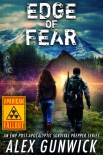Life Goes On by Tayell, Frank (large ebook reader txt) 📗

Book online «Life Goes On by Tayell, Frank (large ebook reader txt) 📗». Author Tayell, Frank
The previous evening, Captain Adams had explained the plan to the crew, giving more detail than Tess had expected, though not nearly as much as she’d have liked. The Te Taiki would be used as bait to draw the large ships out of the harbour and into the bay’s entrance. There, those vessels would be sunk, blocking access or egress to all but the smallest ships. To make the warship appear a tantalising prize, the fast-boats would be allowed to approach close, and even board. That should deter portable artillery fire from the shore until said artillery could be neutralised.
Pirates weren’t zombies; they could shoot back. She didn’t know who the enemy really was. Farmers? Miners? Street-level dealers? Professional mercenaries like Kelly and her crew? What were they armed with? Shotguns, rifles, RPGs? How many were there? What if they were just local survivors, taking shelter on a desolate swathe of coast, hoping a rescue ship might arrive? What if they took prisoners? What if—
But her musings were cut short by Commander Tusitala sliding down the ladder.
“Are we a go?” Hawker asked.
“Cap’n thinks they’re gone,” Tusitala said. “We’re ten kilometres out, and there’s not a squeak on the radar or puff from their power station. We’re going up, but for a recce.”
“That’s me, kid,” Oakes said. “You can pay up when I get back.”
“I thought I was winning,” Zach said.
As the helicopter took off, Tess headed to the bridge.
“Deserting your post, Commissioner?” Adams said, relief evident in both voice and words. “I’ll have to make you walk the plank.”
“There’s nothing on radar?” Tess asked.
“Or radio. Nothing on the horizon.”
“Radiation?” Tess asked.
“Lower than Natal,” Adams said.
Which was an inexact answer loaded with implications.
“Negative visual on the bay,” Hawker’s voice came amplified through the bridge speaker. “No ships. Repeat, no ships in the bay. Negative on artillery. Pier on the western spit. No ships at the pier. Scratch that. Two sunken vessels. Fifty metres long. Steel hull. Cargo ships.”
Tess turned her attention to the images being relayed from the helicopter, still showing the view of the empty bay. The sea became the shore. The shallow beach morphed into desert, except in the south where it rose into grey-shadowed mountains. The image lurched as the helicopter pivoted, and she saw a long and battered pier. Ashore, the beach and desert were stained black with a pitch-trail of carbon leading to a towering mountain of coal.
“Is that the coal bunker?” Tess asked. “Assuming those railway freight cars are a standard size, that’s got to be two hundred metres by five hundred long. That’s a lot of coal.”
“It is,” Adams said.
The freight-railway tracks disappeared into the desert, in turn giving a hint as to where the mines themselves lay, but the helicopter had already moved on, buzzing high over a ramshackle company town where a handful of large villas were encircled by at least a hundred concrete block-houses. Metal roofs. Stubby trees. A basketball court. A stalled car. Onshore fuel tanks. A mansion with a high wall. It was a confused snapshot as the helicopter flew low and fast, but one constant was the bodies.
“They’re all dead,” Tess said, and then corrected herself. “They’re not moving.”
“There’s a desalination plant,” Adams said. “That type of pipe-work is unmistakable. That could be a large diesel turbine next to it.”
“Where?” Tess asked, reflexively turning away from the screen.
“Near the onshore fuel tanks,” Adams said.
“They weren’t burning coal,” Tess said. “Can you ask the commander to turn around?”
“Not until they’ve reached the airport. I want confirmation there’s no aerial threat,” Adams said. “That’s it! There! That’s the runway.”
Three twin-engine civilian island hoppers were parked next to the runway, but there were no helicopters or fighter planes.
“No cooking fires. No smoke. No people,” Tess said. “Just bodies.”
They lay clustered near the runway’s edge. A pile of ten, then twelve, then six, almost as if they’d been waiting for a plane. More likely, the survivors killed some zoms, retreated a few paces, killed some more, retreated again, and again, until they’d died.
“There’s no threat here,” Tess said. “I don’t know what we’ve found, but it’s not a danger to us. Look at this place. It’s nearly perfect for a refuge. Remote. Desolate. With enough coal for a year. But there’s a splash of green beneath those mountains on the southern shore of the bay. There’s water here at the edge of the desert. Oh, it’s perfect, and there’s no one here. Sir Malcolm lied, and sent me to the other side of the world.”
“Commander Tusitala, return to the ship,” the captain said. “Mr Renton, I want a shore party. Take the boat up to the pier. Commissioner, would you care to assist them?”
“Could I borrow the helicopter?” Tess asked. “Send Bruce to the airport. See if there’s anything aboard the planes indicating where they’ve come from. But I’d like the helicopter to drop me off near the houses. That’s where we’ll find food, and where we might find the reason Sir Malcolm sent us here.”
The helicopter’s rotors whipped up a thick black cloud of carbon-stained sand as it slowed its descent to a hover, a metre above the cleared and empty ground adjacent to the coal bunkers.
“Stay frosty, Zach!” Oakes said.
“In this heat, the electricity bill would bankrupt him,” Clyde yelled back. “On three, Zach, but don’t jump.”
Which





Comments (0)